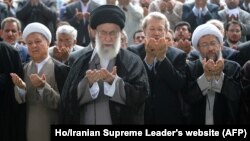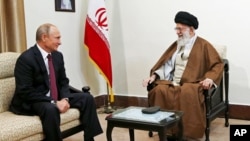Iran's government is under heavy criticism from protesters filling the streets in the largest such uprising since 2009.
The protesters — motivated by unemployment, inflation and a lack of change after the lifting of international sanctions in 2015 — are speaking out against Iran's leaders, and in some cases they're even praising the government overthrown in 1979 by the Iranian Revolution.
Iran's government is known as an Islamic republic, a hybrid of Islam-driven theocracy and a republic led by a president elected by popular vote. The CIA World Factbook classifies Iran as a "theocratic republic."
The current president, Hassan Rouhani, is being criticized lately for failing to channel new funds available in Iran into stemming inflation and creating jobs.
Supreme leader
Above the president, however, is Iran's supreme leader — a position given to an Islamic scholar, currently Ali Khamenei, who has power over a number of government appointments, as well as the Assembly of Experts who chose him. The Assembly of Experts is also a group of Islamic scholars who are well-versed in interpreting Islamic law, or sharia.
Khamenei is Iran's second supreme leader. The first, Ruhollah Khomeini, ruled Iran from the 1979 revolution until his death in 1989.
The supreme leader is the head of state — the most powerful person in government. He appoints many top government officials, including commanders of the armed forces, the head of the state radio and television operation, and members of national security councils.
The supreme leader is also empowered to design the general policies of the Islamic Republic and supervise their execution; issue decrees for national referendums; assume command of the armed forces; resolve differences between branches of the armed forces; sign decrees formalizing elections; pardon or reduce the sentences of convicts; and dismiss the president in the event of an impeachment vote.
The supreme leader makes final decisions on the economy, environment, foreign policy, education, population growth policies and transparency in elections.
The president of Iran is the factor that puts the "republic" in "Islamic republic." The president — in this case, Rouhani — is the highest-level popularly elected position in the country. The president can be elected twice to four-year terms but is answerable to the supreme leader. Rouhani, a moderate, was elected in 2013 to succeed a two-term president — hard-liner Mahmoud Ahmedinejad. In 2017, Rouhani was re-elected for a second term.
Presidential powers
The president's powers include leading the executive branch of government — subject to the supreme leader's supervision; acting as deputy commander-in-chief of the armed forces; declaring states of emergency or enacting martial law; presiding over the National Security Council and Supreme Council of the Cultural Revolution; appointing first vice presidents; nominating cabinet members to parliament; receiving all foreign ambassadors; issuing executive orders; issuing military service medals; and issuing presidential pardons.
Iran's parliament is known officially as the Islamic Consultative Assembly. Its 290 members can legislate on all matters allowed by the constitution, but cannot enact legislation that runs counter to the principles of Islam. It has the right to examine and investigate all affairs of the nation and approve international treaties and contracts. It may receive or authorize international loans, pose questions to the president and hold votes of confidence on presidential elections.
Reports say most of the current protests seem to be aimed at Rouhani and Khamenei.
Protesters say Iran should spend less money in other places such as Syria and Lebanon and more money creating jobs and cleaning up the economic situation at home, where people accuse the government of corruption.
Experts also note that women are participating in these protests, calling for equal rights.






